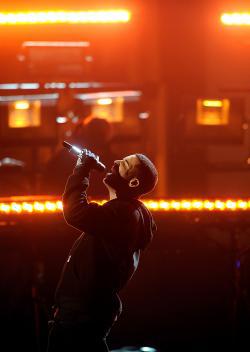Hey pals,
There’s no shortage of Drake Theory in this year’s Music Club. Ann calls him grunge. Nitsuh compares him to crustless pie goop. Carl blames Canada—and Kanye. I’m tempted to get cute and label Drake a classic Jewish neurotic. I definitely think we should be talking about him as an R&B guy at this point, as surely as we should concede that Ke$ha is a rapper.
But back to Carl’s take. I don’t know enough about “Canadian passive-aggression” to comment on that. (My favorite Canuck of 2011, Feist, I’d call aggressively passive: Her singing pumps up indie diffidence—the swallowed syllables and floating folky prettiness—into one of pop’s steeliest styles.) But Carl is right to link Drake’s mopiness to Mr. West.
It goes back to Kanye’s pity party 808s & Heartbreak. In 2008, that album seemed like an end point, the cultural high-water mark for Auto-Tune. But it was actually the beginning of a new era, when desolate production values and what Carl calls “triumphal miserablism” began seeping into the Love Man soul.
In 2011, a black cloud has engulfed the boudoir. There’s Drake, and his Toronto homeboy, Abel “The Weeknd” Tesfaye, and Frank Ocean, of course. Even reliable libertines like Terius “The-Dream” Nash have succumbed to the bummer-sex virus.
I have mixed feelings about this. I like the bleak, noirish music—almost as much as I love Ann’s brilliant line about the production on Take Care: “mansions emptied for foreclosure.” And speaking of sounds, I’m crazy about Frank Ocean’s voice—a supple tenor that will be haunting pop radio for years—not to mention his songwriting voice, the details that give his blues some bite: “I took a seat on the ice cold lawn/ She handed me a ice blue bong.”
But too often, the songs ring false. They’re ponderous and self-important. I don’t buy the idea that these young men are having such a bad time banging groupies. Ann’s comparison to grunge is spot-on: “Marvin’s Room” and “The Birds Part 1” are angst-sex schlock, just like “Jeremy” was Daddy-doesn’t-love-me schlock. I’m all for schlock, but I’ve never had a taste for this flavor; there’s not enough pleasure in it. If I want to wallow in tragically crappy lovemaking, I’m sure there’s an audiobook of On Chesil Beach I can download. From my R&B Don Juans, I like a little more Joy of Sex.
I get Carl’s point that any relief from hip-hop’s sexual politics-as-usual is welcome. But I don’t think that’s what we’re getting from Drake, The Weeknd, et. al. For one thing, they’re so self-involved that women barely figure in their songs. Give Drake a nickel bag and ceiling mirror, and he’s set for the evening.
That’s why I preferred other lotharios in 2011—Miguel, Lloyd, Trey Songz, Jeremih, as well as well genteel grown-and-sexy types like Anthony Hamilton, Robin Thicke, and Kem. None of these guys are feminists, but their songs make room for courtliness, and for His-and-Hers-style pleasure. Compare The Weeknd’s grim “The Birds Part 2”—“She said please, mercy me, mercy me/ Let me fall outta love, before you fuck her, before you fuck her/ She begged me, she gave me all her pills/ Now my back hurts”—to Miguel’s pillow-talk in “Sure Thing”:
Love you like a brother
Treat you like a friend
Respect you like a lover…
If I’m the blunt
ou could be the lighter, babe
Writer, babe
You could be the quote
If I’m the lyric, baby
You could be the note
The truth is, I don’t think that the R&B slow jam needed a revisionist overhaul—at least no more of an overhaul than the one that R. Kelly gave it years ago, when “Trapped in the Closet” taught the world that Casanova clichés could be twisted from self-parody to absurdist comedy and pathos. Ever since, Love Man soul has been one of pop’s most reliably eccentric subgenres—and, in an age of rampant crossover, and one of its most racially walled-off. Today, only two black male singers, Usher and Chris Brown, are legit pop stars. Other singers—guys like Lloyd and Miguel, who are fixtures of black radio and BET—barely register a blip on the mainstream pop radar. The No. 1 song on the Billboard R&B/Hip-Hop Songs chart in 2011, Miguel’s “Sure Thing,” squeaked onto the year-end Hot 100 Songs at No. 92. All of which makes the Quiet Storm stylings of white hipsters like Destroyer and How To Dress Well especially interesting.
I have another little theory about male R&B singers: They’ve gotten weird because they had no choice, having been rendered marginal by their world-beating female counterparts. Girls continued to run the world in 2011, and I’d hoped to discuss B. and Rih-Rih and Gaga and Britney and (ugh) Adele in this round. But the spanish fly fumes went to my head. I’ll get to those thoughts next time.
Jody
